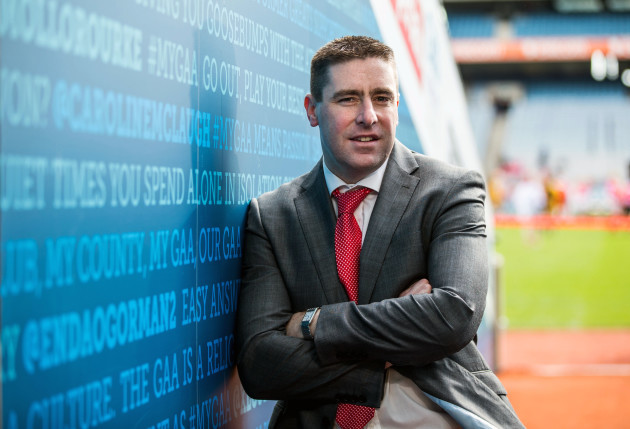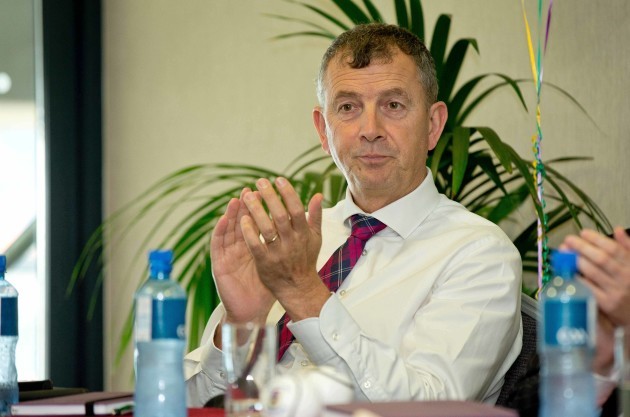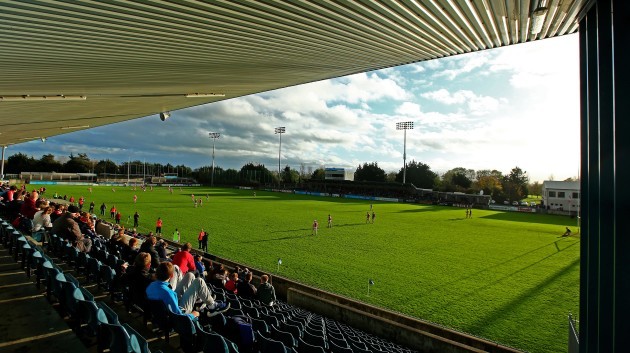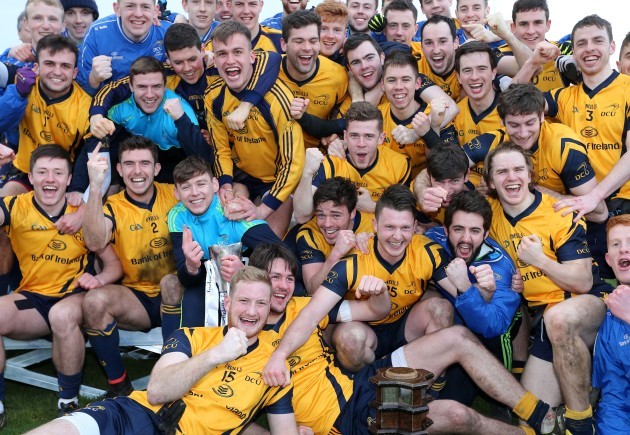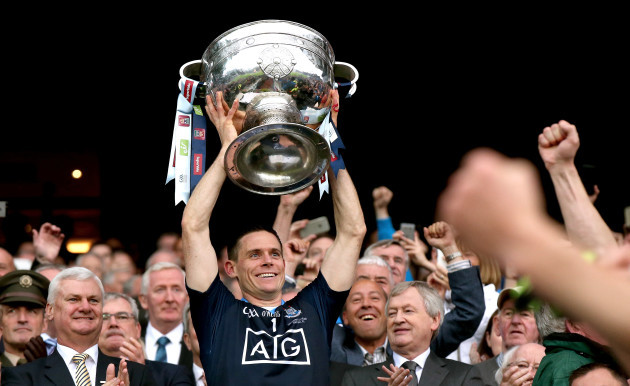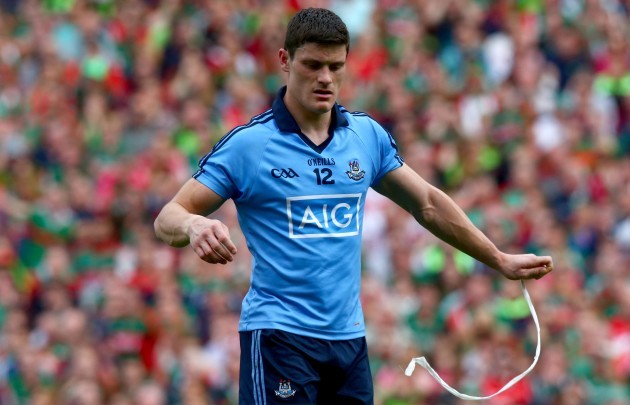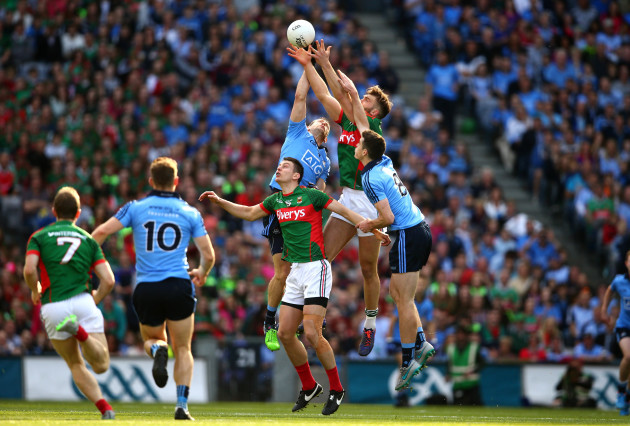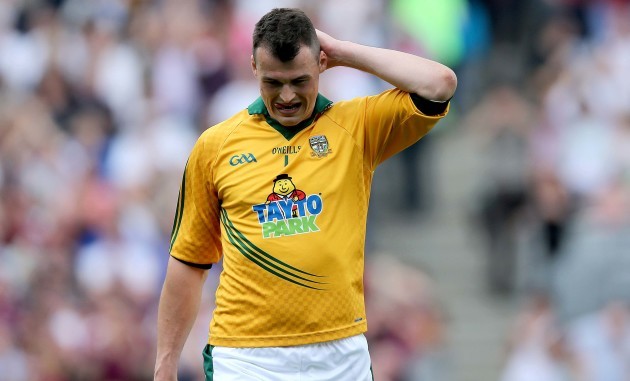DUBLIN COUNTY BOARD CEO John Costello has taken aim at former Kerry star Darragh Ó Sé for ‘mean-spirited’ remarks aimed at Diarmuid Connolly earlier this year.
Writing in his Irish Times newspaper column in June, Kingdom legend Ó Sé stated that ‘there’s still a bit of scamp in him (Connolly)’ and that there was ‘something to be said for pulling his tail and seeing if he’ll hiss back at you.’
Reflecting on Dublin’s season in his wide-ranging annual report, Costello hit back at Ó Sé, accusing him of using ‘somewhat inflammatory’ language.
“You could argue ‘the ball was throw-in’ very early in the summer ahead of any potential Dublin v Kerry clash,” Costello writes.
“In a pre-championship preview, legendary Kerry footballer, Darragh Ó Sé, as good as placed a target on the back of one of our most outstanding footballers, Diarmuid Connolly.
“In my opinion, some of the content was mean-spirited and the choice of language was somewhat inflammatory.”
Elsewhere in his report, Costello calls for an overhaul of the All-Ireland senior football championship by splitting the competition into four ‘conferences.’
He also believes that GAA disciplinary chiefs are “reacting too much” to flashpoint incidents discussed at length on The Sunday Game, insisting that there’s now a perception that TV and extended media are setting the ‘setting the agenda.’
Costello also reveals his displeasure with Croke Park officials for what he describes as a poor contribution towards a team holiday for the All-Ireland senior football champions.
Costello is once again calling for two referees to be used in the secondary pre-season provincial competitions on a trial basis and he’s gone one step further by campaigning for the introduction of a TMO (Television match official) to adjudicate on contentious incidents in big games.
Costello also discusses the dangers of social media while also discussing the ‘subterfuge’ involved in the failed attempt to obtain a 35-acre Spawell site in Dublin from NAMA, which would have been used to build a new stadium.
Here are the key points from Costello’s report:
Spawell
In June, it became clear that our bid was unsuccessful and we had come second to a speculative investment fund which had submitted a slightly higher bid.
The Committee was bitterly disappointed with the outcome, particularly because no credit was given to the community aspect of our offer.
I publicly expressed our frustration at the waste of so much voluntary effort over the years and the national media picked up on the theme.
NAMA’s response was that they were not the seller, rather it was a (NAMA-appointed) receiver who was obliged to accept the highest price.
This piece of subterfuge allowed NAMA to slip the noose and ignore a central piece of their mandate which is to ‘contribute to the social and economic development of the State’ as required under Clause 2 (viii) of the NAMA Act, 2009.
U21 v Sigerson
The recently reactivated debate about the future of the under-21 football championship – specifically its discontinuation as Árd Stiúrthóir Páraic Duffy proposes – has got me thinking.
You are an elite young player, just turned 20, and hoping to stake a claim sooner or later for inclusion on your county’s senior football squad.
You have an either/or choice: play for your county at U21 level, or play for your college in the Sigerson Cup … but you can’t do both. My suspicion is that a majority – not all but still a strong majority – would opt for U21.
The Sigerson Cup is a wonderful competition in its own right and, in a Utopian world, could continue long into the future alongside the U21 championship.
But the GAA fixtures calendar, with its crazily congested spring months, is anything but perfect.
If something has to give (and evidently a pre-Christmas Sigerson switch is probably not feasible) my argument is that the U21 inter-county grade is more deserving of preservation, with the Sigerson played in a more condensed period early in new year.
Football Reform: Time for a Conference Call
My starting point would be a redrawing of the provincial boundaries to give us four conferences of eight counties.
Obviously some counties on the periphery of a province would have to move. These details would obviously require some negotiation, not to mention broad agreement but, at least, it would set every provincial council on an even footing.
Should we then run off these conferences on an open draw basis (winners advancing, losers detouring to the qualifiers) or consider Champions League-style groups?
My preference would be for the status quo, as the latter could produce too many dead rubbers. Either way, fixtures could be streamlined to run off our conferences in a less lopsided and more speedy fashion … and, crucially, every county that keeps on winning would be faced with the same number of fences to reach the All-Ireland.
But what will this do for the weaker counties? Good question. But so long as the vast majority of those counties – and their players – are opposed to entering a ‘B’ championship, there is little point foisting one upon them.
Trial by TV
Are the GAA’s disciplinary bodies reacting too much to what’s shown on TV in highlights programmes, in particular?
For some reason – possibly because the ‘Sunday Game’ goes on for so long on a Sunday night – the flesh is picked off disciplinary bones until the bone itself is being chewed on.
Nobody is condoning ill-discipline but there’s now a view among a lot of GAA people that TV re-runs, whether during ‘live’ or ’highlights’ programmes set the agenda for games which have already been regulated by no fewer than seven officials.
Newspapers then pick up on it and suddenly even trivial things become an issue. Again, nobody is condoning wrongdoing but it’s not good for the disciplinary system if there’s a perception that TV and the extended media is setting the agenda, simply as part of entertainment.
How many times have we seen disciplinary action taken against a player, whose case wasn’t highlighted on TV? Rarely, if ever.
However, we have seen plenty of examples of borderline cases being dissected frame-by-frame on television, followed by a case taken by CCCC.
That’s particularly the case later in the championships when TV has so much time to dwell on a few games. Compare it with soccer and rugby coverage.
Yes, incidents are reviewed if it’s warranted in soccer and rugby but not to anything like the same degree as in football and hurling.
The GAA has no control over television or the rest of the media but it can control its own disciplinary affairs and not be dictated to by a TV programme trying to fill out time.
If the offence warrants it – take whatever tough action is required, but don’t always respond to incidents shown in slow motion, which can distort reality. In others words, be strong when we have to, not when others tell us we have to.
Bah Humbug!
It would appear Charles Dickens’ Ebenezer Scrooge has taken up residence off Jones Road this festive season!
Following our superb All-Ireland success this September the Dublin County Board contacted Croke Park looking for an additional grant from the proceeds of the Semi-Final Replay against Mayo towards the financing of a team holiday for the players this December.
After a year, when once again, the Dublin footballers proved to be the most successful in the country and attracted the largest crowds to headquarters, we were promised the princely sum of €15,000.
Maybe we can be thankful for small mercies as that was a 50 per cent increase on what we were originally granted.
However, the increase was short-lived as the CCCC recouped that exact amount within 48 hours following the Donnybrook in Boston! (Fine imposed following the Fenway Hurling Classic brawl).
We don’t feel we have a sense of entitlement but we think that after a campaign that included a near full-house (81,897) for our All-Ireland SFC semi-final replay against Mayo, the purse strings could have been loosened a little bit at least.
We also know that Dublin’s commercial value to the central coffers exceeds any other county by a stretch.
In recent years, counties involved in an All-Ireland Final Replay have received additional holiday grants of €50,000 and the receipts from the Semi-Final Replay would, I estimate, be comparable.
Perhaps the reason for the reduction is that our opponents were having, what you might term ‘industrial relations issues’ regarding their players/management interface at the end of this summer, that Croke Park were not prepared to grant us any more finances.
The Croke Park stadium is practically debt free, a superb achievement for the Association.
But it has to be asked – was the main driving force in achieving this not off the backs of players who have made such huge sacrifices and brought so much joy to the masses?
Surely then they should be rewarded at season’s end with a bit more Christmas cheer, rather than a bit of ‘Christmas Carol’?
Social Media
In the past I have written about the dangers of the misuse of Twitter and its role in the race to the bottom. Unfortunately I have to revisit the subject.
This summer, Meath goalkeeper, Paddy O’Rourke, was subjected to vile and sickening abuse via Twitter. Some of the content included threats of physical violence.
At the time there were calls from some quarters that the Gardaí should be called in to investigate the matter and I’d echo that stance.
I have read some disgraceful abuse also of some of our own players in the aftermath of championship games, some of which, I believe, is heading down the road of incitement to hatred and must be silenced.
Help for referees
Sometimes, it’s hard to escape the impression of a referee (who is human and fallible, like the rest of us) being hung out to dry by technology.
Well, why not let that same technology come to his aid? In my 2013 report, I suggested that it might be worth experimenting with two referees in the early-season competitions such as the O’Byrne and Walsh Cups in Leinster and the McKenna Cup, etc, elsewhere.
I have seen nothing to alter my stance since then – surely four eyes would be better than two? But why not go a step further and introduce a television match official, or TMO?
Yes, I appreciate this would pose huge logistical – and perhaps financial – headaches for our Association.
And it could potentially spawn too many stoppages and prove a turn-off for supporters and some other unforeseen problems might also emerge. But we’ll never know without trying and, who knows, the positives could far outweigh the negatives.
So why not, purely on an experimental basis for televised league matches, introduce a TMO? Confine his sphere of responsibility to specific calls such as penalties (e.g. was it a foul and, if so, was it committed inside or outside the large parallelogram?); disciplinary flashpoints (e.g. deciding on yellow, black or red cards) and the eligibility of goals (e.g. did the ball or sliotar cross the line before it was cleared?).
We already have Hawk-Eye to adjudicate on points and, notwithstanding one early awful glitch affecting the Limerick minor hurlers, it has been a major success.
It meant there could be no caveats hanging over the drawn All-Ireland hurling final of 2014, after John O’Dwyer’s late attempted winner for Tipperary was shown to be wide.
Meanwhile, during the recent Rugby World Cup, we could all see how the TMO – once properly utilised – can clear up confusion and greatly reduce the potential for incorrect 24 decisions deciding the outcome of major sporting contests. And ultimately, isn’t that what we all want?

